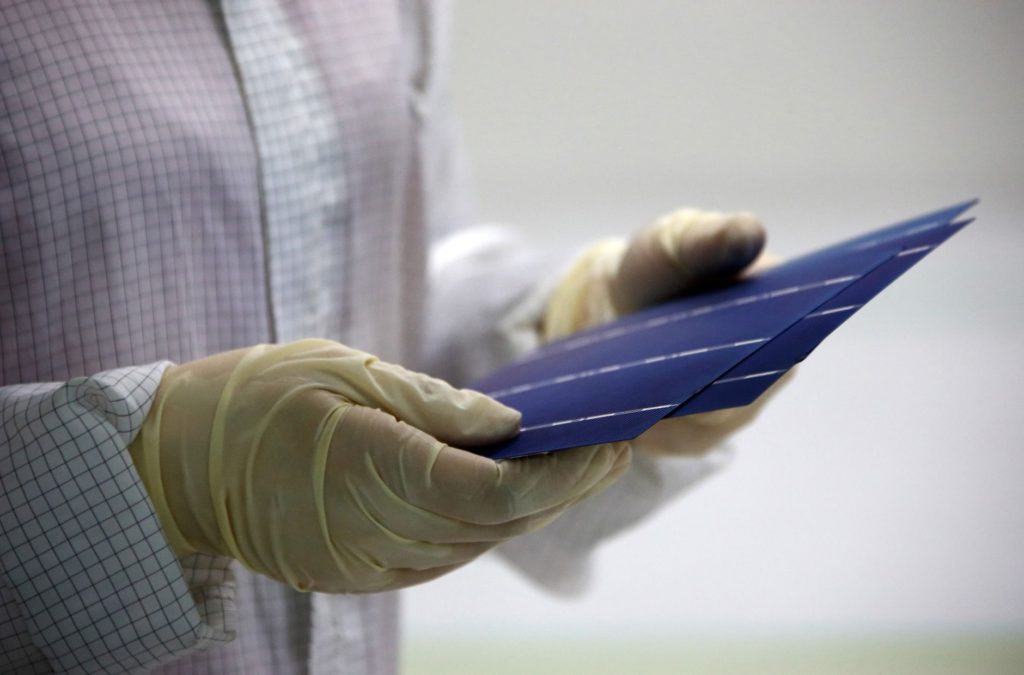(Bloomberg) — The U.S. is launching an investigation into whether Chinese solar-equipment manufacturers are evading tariffs by sending components to other Asian nations for assembly before exporting the finished products.
A decision by the U.S. Commerce Department to open a probe requested by Auxin Solar Inc., a small California panel maker, marks the first formal step of an investigation that could span a year and culminate in expanded duties on the imports.
The inquiry threatens to have the most impact on the U.S. solar sector, which relies on Malaysia, Vietnam, Thailand and Cambodia for about 80% of module supply, rather than China’s giant solar producers, which typically generate only a small portion of revenue in North America.
“We see severe implications for the U.S. solar industry,” Jeffrey Osborne, an analyst at Cowen & Co., said in a note. “There is limited domestic supply to offset the supply loss.” Some solar advocacy groups warn the inquiry could drive up prices and undermine President Joe Biden’s action on climate change by slowing the pace of clean energy installations.
First Solar Inc., the biggest U.S. manufacturer, rose 5.6% Monday, as the decision should boost the small handful of domestic suppliers. China-based Longi Green Energy Technology Co., the largest global solar supplier, fell 2% Tuesday in Shanghai, while Jinko Solar Co. declined 1.3% and Trina Solar Co. was 0.6% higher.
Longi, Jinko and Trina didn’t immediately respond to requests for comment on the U.S. decision. Chinese Foreign Ministry spokesman Wang Wenbin said the U.S. is engaging in protectionism that will destabilize global supply chains.
“This will boomerang on itself and hurt the U.S.’s own interests,” he said during a regular press conference on Tuesday.
San Jose, California-based Auxin Solar filed its request for an investigation in February, alleging that manufacturers in Asian nations were using components from China and skirting duties. “We are grateful Commerce officials recognized the need to investigate this pervasive backdoor dumping and how it continues to injure American solar producers,” Chief Executive Officer Mamun Rashid said in an email.
The tariffs at issue date back to 2012, when the U.S. imposed duties on solar cells and modules from China under then-President Barack Obama after determining Beijing-backed companies were selling at cut-rate prices. Factories soon popped up elsewhere in Southeast Asia that produced solar cells and panels that weren’t subject to the tariffs.
Some solar manufacturing advocates have argued that a combination of tough trade enforcement and tax incentives are needed to help bolster the production of clean-energy equipment inside the U.S. They hailed the Commerce Department decision.
“The Biden administration has chosen to side with American companies and workers,” Zach Mottl, chairman of the Coalition for a Prosperous America, said in an emailed statement.
‘Significant Impact’
But renewable power advocates said the probe would harm an industry that’s critical to the president’s climate goals. “If its commitment to a clean energy future is real, the administration will reverse this decision immediately,” Heather Zichal, chief executive officer of the American Clean Power Association, said in an emailed statement.
The inquiry will make it harder to achieve emissions reductions targets, according to the Solar Energy Industries Association CEO Abigail Ross Hopper, which said the group would press for a quicker resolution to the probe.
The Commerce Department said it would issue its preliminary findings in 150 days. A final determination is due in 300 days, with the potential for one 65-day extension. The agency will ask companies in the targeted nations for information about their solar cell and module production and shipments to the U.S., the department said.
(Updates will China Foreign Ministry comments in 6th and 7th paragraphs)
More stories like this are available on bloomberg.com
©2022 Bloomberg L.P.











